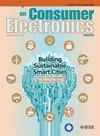基于物联网的智慧城市联合任务卸载和功率控制优化:基于深度强化学习的节能协调
IF 10.9
2区 计算机科学
Q1 ENGINEERING, ELECTRICAL & ELECTRONIC
引用次数: 0
摘要
移动边缘计算(MEC)通过减少数据传输距离来提高计算效率,但随着用户数量的增长,优化资源分配和降低运营成本仍然是关键挑战。研究时变信道环境下的多用户部分计算卸载系统,提出了一种基于深度强化学习的框架,以最小化延迟和能耗加权和为目标,对卸载策略和功率控制进行联合优化。针对该问题的多参数、高耦合和非凸特性,首先利用深度神经网络生成卸载比向量,然后使用改进的k-最近邻(KNN)算法对其进行离散化。在量化卸载动作的基础上,采用差分进化算法寻求最优功率控制。最后,将最优动作和状态向量存储在经验重放池中,用于后续的网络训练,直到收敛,产生最优解。数值结果表明,改进的量化方法在加速收敛的同时避免了额外的动作探索。此外,该算法显著降低了用户设备的延迟和能耗,优于其他方案,并提供更高效的边缘计算服务。本文章由计算机程序翻译,如有差异,请以英文原文为准。
Joint Task Offloading and Power Control Optimization for IoT-Enabled Smart Cities: An Energy-Efficient Coordination via Deep Reinforcement Learning
Mobile Edge Computing (MEC) enhances computational efficiency by reducing data transmission distance, yet optimizing resource allocation and reducing operational cost remain critical challenges as the number of users grows. This paper investigates a multi-user partial computation offloading system under the time-varying channel environment and proposes a novel deep reinforcement learning-based framework to jointly optimize offloading strategy and power control, aiming to minimize the weighted sum of latency and energy consumption. Due to the problem’s multi-parameter, highly coupled, and non-convex characteristics, a deep neural network is firstly utilized to generate offloading ratio vectors, which are then discretized using an improved k-Nearest Neighbor (KNN) algorithm. Based on the quantized offloading actions, the Differential Evolution (DE) algorithm is employed to seek the optimal power control. Finally, the optimal action and state vectors are stored in an experience replay pool for subsequent network training until convergence, producing the optimal solution. Numerical results demonstrate that the proposed improved quantization method avoids the additional action exploration while accelerating convergence. Furthermore, the proposed algorithm significantly lowers user devices latency and energy consumption, outperforming other schemes and providing more efficient edge computing services.
求助全文
通过发布文献求助,成功后即可免费获取论文全文。
去求助
来源期刊
CiteScore
7.70
自引率
9.30%
发文量
59
审稿时长
3.3 months
期刊介绍:
The main focus for the IEEE Transactions on Consumer Electronics is the engineering and research aspects of the theory, design, construction, manufacture or end use of mass market electronics, systems, software and services for consumers.

 求助内容:
求助内容: 应助结果提醒方式:
应助结果提醒方式:


